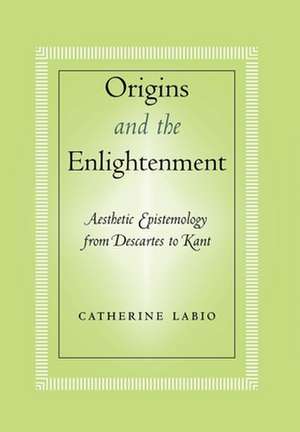Origins and the Enlightenment – Aesthetic Epistemology from Descartes to Kant
Autor Catherine Labioen Limba Engleză Hardback – 5 oct 2004
One of the most striking facets of Enlightenment thought, according to Labio, is the emergence of aesthetics as a master discourse that enabled its users to make sense of worlds ostensibly unrelated to the arts. In particular, once knowledge became defined as knowledge of things made by human beings, originality became valued not only for its novelty but also as a guarantee of epistemological certainty. Labio analyzes the views held by a variety of European thinkers--including Baumgarten, Condillac, Descartes, Kant, Locke, Rousseau, Adam Smith, Vico, and Edward Young--on the origins of ideas, languages, nations, nature, and wealth. Throughout, the author deals with a wide range of primary and secondary materials.
Preț: 473.07 lei
Nou
Puncte Express: 710
Preț estimativ în valută:
90.53€ • 93.98$ • 75.49£
90.53€ • 93.98$ • 75.49£
Carte tipărită la comandă
Livrare economică 22 martie-05 aprilie
Preluare comenzi: 021 569.72.76
Specificații
ISBN-13: 9780801442759
ISBN-10: 0801442753
Pagini: 208
Dimensiuni: 152 x 229 x 22 mm
Greutate: 0.43 kg
Ediția:New.
Editura: MB – Cornell University Press
Locul publicării:United States
ISBN-10: 0801442753
Pagini: 208
Dimensiuni: 152 x 229 x 22 mm
Greutate: 0.43 kg
Ediția:New.
Editura: MB – Cornell University Press
Locul publicării:United States
Descriere
What epistemic assumptions framed eighteenth-century thinkers' speculations regarding origins? What, if anything, connected these speculations? The best way to understand the Enlightenment's obsession with origins is to study it in conjunction with...
